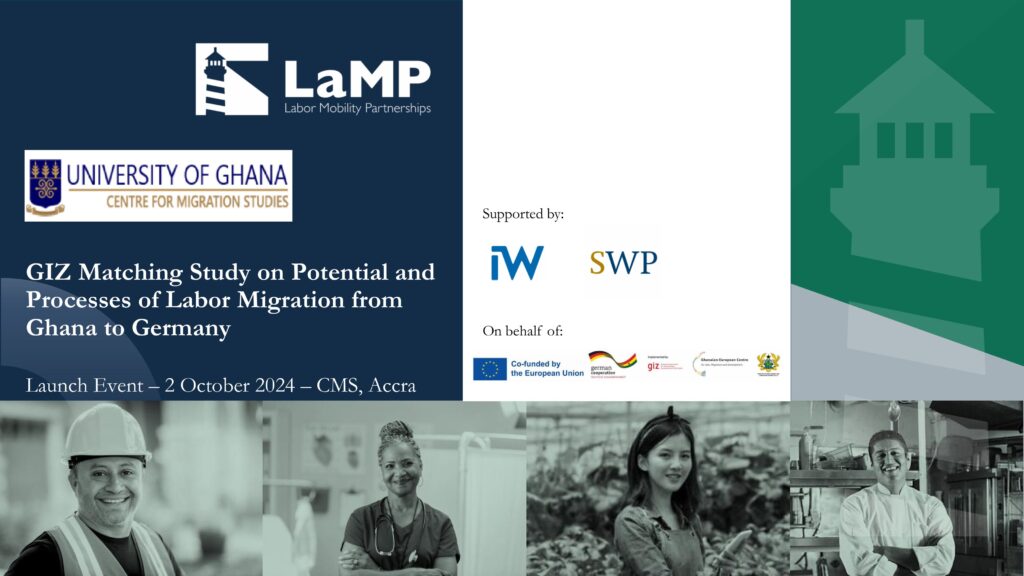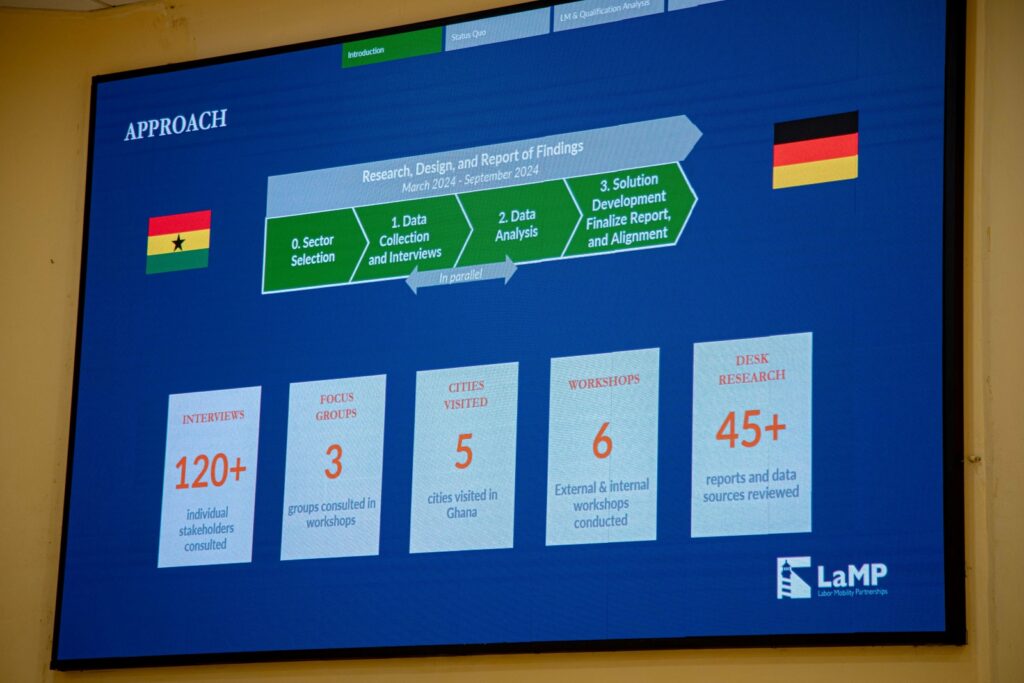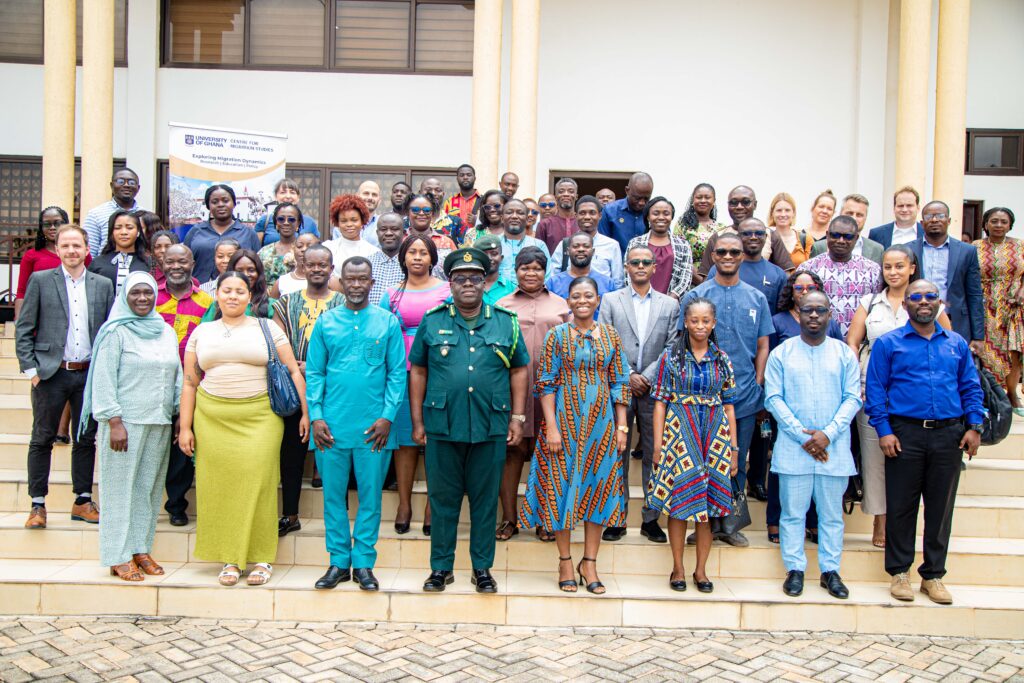Migration has long been a complex force in global economies and continues to present both opportunities and challenges to many nations. A new study is offering a new perspective on how the pressing issues of the unemployment crisis in Ghana and Germany’s acute shortage of skilled workers can be addressed through strategic and well-coordinated migration.
The study, launched in October 2024, dubbed “GIZ Matching Study on Potential and Processes of Labor Migration from Ghana to Germany” shines a light on how strategic labor migration can be a win-win for both countries, unlocking new opportunities for economic growth and development.

Ghana’s Unemployment vs. Germany’s Labor Needs
The findings of the study present a stark contrast between the labor landscapes of Ghana and Germany. While Ghana faces an unemployment crisis, with nearly six million jobless citizens, Germany is struggling to fill critical gaps in its workforce due to an aging population.
Sectors such as construction, information technology (IT), and manufacturing were identified as particularly affected, presenting a significant opportunity for Ghana’s skilled workforce to fill these vacancies. This alignment of supply and demand could provide a solution to both countries’ challenges, the study suggests.
In her remarks, Prof. Mary Boatemaa Setrana, Director of CMS who is also the IDRC Research Chair on Forced Displacement in Anglophone West Africa, highlighted the significance of the study’s findings for both policymakers and practitioners.

“This study is a crucial step in leveraging the potential of labor migration for mutual benefit,” she said. “It is not only about migration but ensuring that the people involved benefit sustainably through skills transfer and enhanced opportunities.”
Key Findings and Opportunities for Collaboration
The study’s findings indicate that three primary sectors, construction, IT, and manufacturing, offer high demand in Germany for skilled workers. These sectors, identified as critical areas for migration, provide clear pathways for Ghana’s youth, particularly those with skills in construction technology, electrical engineering, and software development.
Benedikt Coekoll, a representative from LaMP, explained that Germany’s labor market faces significant gaps. “The aging workforce in Germany means the country needs skilled workers from abroad to maintain its economic growth, particularly in construction, IT, and manufacturing,” Coekoll said. “This is where Ghana comes in as a potential partner. Many Ghanaian workers already possess the necessary technical skills that could be matched to these sectors.”

Bridging the Gap through Education and Language
To effectively harness this potential, the study proposes several key recommendations aimed at strengthening the migration process. First, there is a call for an enhanced focus on Technical and Vocational Education and Training (TVET) in Ghana. The study emphasizes that improving access to training in sectors like construction and IT, and ensuring the training is aligned with Germany’s labor market needs, will be essential to fill the skills gap.
Second, the study highlights the importance of language skills. For Ghanaian workers to succeed in the German labor market, proficiency in the German language is crucial. The research advocates for greater access to German language training, particularly for students and apprentices in Ghana’s vocational education system.

Finally, the study calls for the creation of structured placement networks between Ghana and Germany. These networks would ensure that skilled workers can navigate the migration process smoothly, with strong support systems both before and after departure. “We need a robust system that connects skilled workers with employers, ensures safe migration, and facilitates the integration of migrants into Germany’s workforce,” Prof. Setrana said.
The Role of Policy and International Collaboration
A major takeaway from the launch event was the need for strong collaboration between governments, private agencies, and international organizations. The Ghana Immigration Service (GIS) and labor departments in both countries were represented at the event, reinforcing the importance of a coordinated effort in making skilled migration work. There was also a clear call for the German Embassy in Ghana and other stakeholders to join forces in building awareness and improving migration pathways for skilled workers.
Mr. Andreas Berding, Manager at GIZ Ghana, emphasized the importance of policy support in facilitating labor mobility: “The potential of labor migration between Ghana and Germany is enormous. But this can only be realized if we work together, governments, private sector actors, and international organizations—to create a policy framework that is both effective and protective of migrant workers.”

Moving Forward
The study’s findings and the subsequent recommendations reflect a path forward that could lead to greater economic cooperation and prosperity for both countries.
As Mr. Owusu Mensah, Deputy Comptroller-General of Ghana Immigration Service with responsibility for Administration and Finance, stated, “This study marks the beginning of a new chapter in our efforts to harness labor migration as a means of fostering sustainable development. It is about bridging the skills gap and creating opportunities for economic growth.”

The collaboration between Ghana and Germany has the potential to transform labor migration into a sustainable model that benefits workers, employers, and the economies of both nations.
These findings and recommendations will continue to shape policy discussions with the hope that both countries can come together to create a future where labor migration can be leveraged to addresses immediate workforce shortages and also creates long-term growth and development.

This study has shown that the key to addressing labor shortages and unemployment in both Ghana and Germany lies in mutual collaboration and targeted action. With the right policies, training, and support, labor migration can be a tool for development, benefiting individuals, communities, and nations alike.

